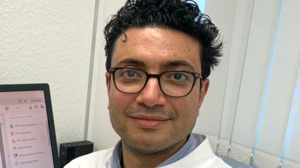Funded researchers: Dr. Johannes Jungilligens & Dr. Abdelrahman Rayan
Dr. Johannes Jungilligens
Faculty of Psychology

Foto (c) RUB Kramer
Functional neurological disorders (FND) are a group of medical diagnoses characterized by the presence of neurological symptoms (such as tremor, movement disorders, seizures) without apparent neurological causes like stroke or brain tumor. Thus, they have long been understood to be of psychological origin. They often occur in the context of traumatic experiences or other psychological burden. Although FND are the second most common cause of neurological referral and despite their adverse effect on patient quality of life and burden of healthcare costs, they remain an understudied entity in the no-mans-land between psychiatry and neurology. As a neuropsychologist and neuroscientist at University Hospital Knappschaftskrankenhaus Bochum, I worked with patients with FND for several years, both on a clinical and a scientific level. The Gateway Fellowship enables me to join the Functional Neurology Research Group at Harvard Medical School, Boston USA, for six months. The Functional Neurology Research Group, led by Professor David Perez, has developed an advanced way to analyze a particular neuroimaging technique (DTI, diffusion tensor imaging) with special consideration of the characteristics of FND. DTI is a neuroimaging modality to map nerve fibers within the brain, allowing to examine structural brain networks and their characteristics. Throughout my stay, I will learn and apply the advanced DTI analysis. Additionally, a new aspect will be added to the analysis by including brain-surface measures, which will allow for a multimodal in-depth analysis of brain network properties exploiting cutting-edge techniques. This helps to substantially advance the understanding of brain network properties underlying FND. Based on the findings and our advances in illness understanding, specialized new therapy options may be developed.
Dr. Abdelrahman Rayan
IGSN

In his book ‚The Mind of a Mnemonist‘, the neuropsychologist Alexander Luria wrote about his case study S., who had a phenomenal recalling memory, yet he could not extract the relevant knowledge/meaning from it. Accordingly, we do not use our memories to remember the past; instead, we extract knowledge to enable future decisions. Thus, investigating memory formation and the transformation of everyday events into knowledge represents an essential question in neuroscience research. Although we made substantial progress in understanding the basic mechanisms underlying memory formation, we lack the knowledge of how information is extracted from single memory events to form semantic memory networks due to the lack of appropriate behavioral paradigms in rodents. Consequently, Ass. Prof. Lisa Genzel - Donders Institute for Brain, Cognition, and Behavior, Netherlands - developed a novel behavioral task - Object Space Task (OST) - to enable the contrast between episodic- and semantic-like memories in rodents. The OST successfully tested and differentiated between different memory responses and measured quantitatively if rodents could extract knowledge from several memory episodes. However, the specific neural correlates corresponding to episodic memory and knowledge extraction remain uninvestigated. Thus, I intend in my GF to examine the neural correlates underlying memory formation and knowledge extraction in two relevant brain areas: hippocampus and retrosplenial cortex. Hippocampus is a structure within the brain responsible for enabling us to find our ways within the environment; simply, it is the GPS of our brains. Furthermore, the retrosplenial cortex plays an essential role in spatial cognition and memory retrieval. Hence, I will spend the GF at the Memory Dynamics Lab (Genzel’s Lab) in Nijmegen, Netherlands. Aside from being the lab that developed the behavioral task, Dr. Genzel has a strong reputation in memory research by combining novel behavioral studies and electrophysiology. Moreover, the lab has the necessary resources and experience to help me to accomplish my project.
- Forschungsbezogene Kompetenzen: Workshops & Veranstaltungen
- Karrierevorbereitung: Workshops & Veranstaltungen
- Forschungsmanagement Skills: Workshops & Veranstaltungen
- Liste aller Workshops & Veranstaltungen
- Förderprogramme zur Internationalisierung
- Beratung & Ombudsperson
- Promovierenden-Datenbank
- Welcome Hour
- Newsletter


